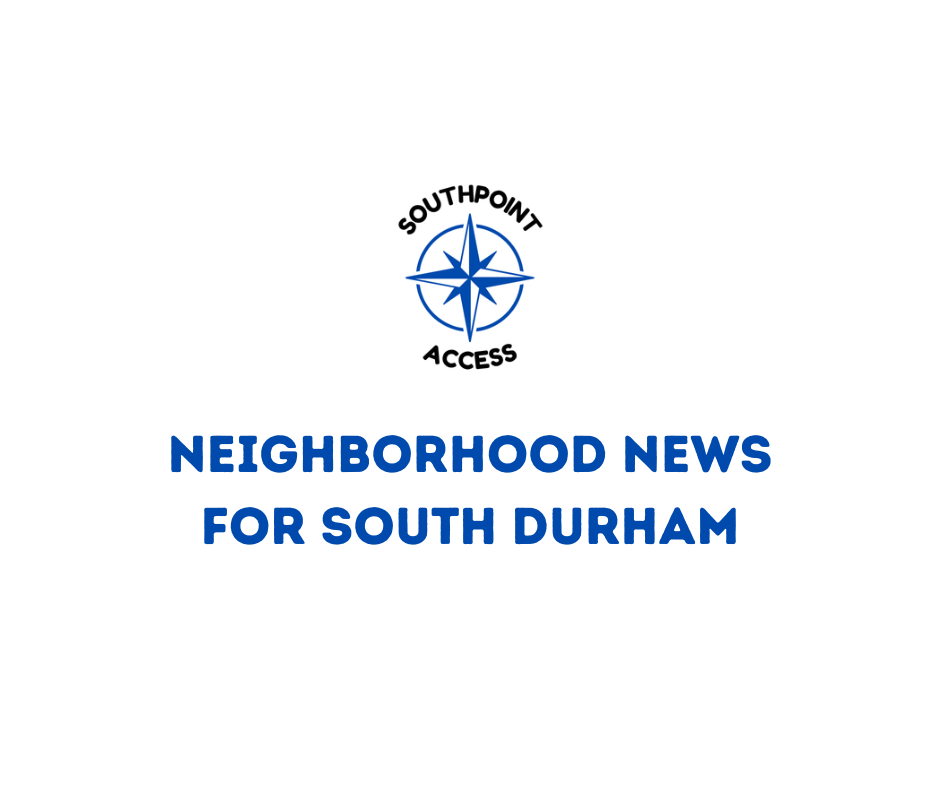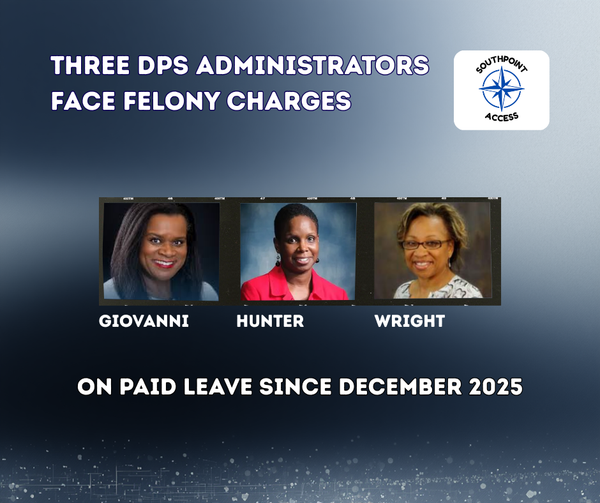Protecting Durham's Immigrant Families: Preparing for Uncertainty in a Second Trump Term [English]
In South Durham, schools play a vital role in creating stability for immigrant students.
![Protecting Durham's Immigrant Families: Preparing for Uncertainty in a Second Trump Term [English]](/content/images/size/w1200/2025/01/immigration2025.png)
As worries about immigration enforcement grow, families in Durham are taking steps to prepare for the potential impact of raids at home, work, and school. For many immigrant families, schools are more than just places of learning—they are safe havens where children can thrive without fear.
In South Durham, schools play a vital role in creating stability for immigrant students. But with uncertainty surrounding immigration policies and enforcement, families and educators are asking a critical question: How can we protect children and ensure their education isn’t disrupted during times of crisis?
Generally, under Immigration and Customs Enforcement’s current policy, schools are considered a “sensitive location” in which ICE officers and agents should refrain from enforcement actions except in extraordinary circumstances.
The impending second Donald Trump presidency has amplified fears that this understanding could change. During his first term, the Trump administration pursued aggressive immigration policies, including increased ICE raids, expanded detention, and the separation of families at the border. His return to the White House may bring renewed enforcement measures, prompting immigrant families to prepare for potential disruptions and seek ways to protect their children.
The Legal Foundation for Educational Access
Durham’s diversity is one of its greatest strengths. Immigrants contribute significantly to the community, enriching the cultural fabric of neighborhoods, schools, and local businesses. However, shifting immigration enforcement practices and policies could leave those families unsure of their rights and uncertain about how to prepare.
Legally, all children, regardless of immigration status, are entitled to a public education. This protection stems from the landmark 1982 Supreme Court decision Plyler v. Doe, which affirmed that schools cannot deny access to students based on their or their parents’ immigration status. While the law is clear, the reality is more complex. Families worry about how to respond if a parent or guardian is detained, while educators grapple with balancing legal compliance and their desire to protect vulnerable students.
In this challenging environment, Durham families and schools must look for ways to plan and prepare. By understanding their rights and working together, the community can help ensure children remain safe and supported, no matter the circumstances.
Schools are uniquely positioned to provide stability for immigrant families during uncertain times. For many, they represent not just a place of education but a safe space where children are shielded from the fears that may follow them at home. In Durham, schools can play a proactive role in ensuring students and families feel protected, regardless of their immigration status.
One critical way schools can serve as safe havens is by establishing clear policies to limit access for immigration enforcement agencies. Drawing inspiration from California’s immigrant protection framework, Durham schools can adopt measures to designate campuses as protected spaces. This means requiring legal warrants before allowing any interaction with immigration officials and training staff to respond appropriately if ICE visits a school.
How It Has Worked in Durham Schools
In 2016, the DPS Board of Education passed a resolution opposing any ICE actions that might harm their students – including deportation.
In 2019, then Superintendent Pascal Mubenga issued specific district employee guidance:
- All students have the right to attend Durham Public Schools.
- All students’ records other than directory information are protected by federal law (FERPA). The only relevant exceptions are when there is a judicial order/subpoena, when there is a health or safety emergency, or in matters regarding the juvenile justice system.
- Only the following directory information is a public record by district policy:
o student’s name,
o the parents’/guardians’ names,
o the student’s age,
o the student’s photograph,
o the student’s participation in officially recognized activities and sports,
o the weight and height of members of athletic teams,
o the dates of the student’s attendance,
o degrees and awards received by the student, and
o the most recent previous educational agency or institution attended by the student.
- A student’s address or telephone number is not directory information and not a public record.
- It is a violation of FERPA for law enforcement officers to directly access student information or student databases such as PowerSchool records.
- DPS staff should never inquire about any student’s immigration status, and releasing such information could violate their rights.
- By district policy, if law enforcement officers need to come to a school for official business, they first should contact school administration.
- Contact between the school and law enforcement on matters involving students shall be made through the office of the principal or superintendent.
- Any request to gather information, interview students, or access a school site by any law enforcement officer or federal agency for immigration enforcement or monitoring shall be immediately forwarded to the Superintendent for review and a decision on whether to allow access to the site.
- Emergency situations and pressing safety concerns override this guidance.
Clear communication with families is equally important. Schools should reassure parents that immigration status is not collected or shared and provide resources to help families understand their rights. Hosting "Know Your Rights" workshops or sharing multilingual materials on how to prepare for potential enforcement actions can go a long way in building trust and ensuring families feel supported.
Durham Public Schools also could enhance their role by connecting families to community organizations offering legal aid, counseling, and emergency planning resources. By partnering with groups like El Centro Hispano or the North Carolina Justice Center, schools can expand their capacity to serve as hubs of support.
Finally, educators and school leaders must receive training to handle immigration-related scenarios sensitively and legally. This includes understanding the boundaries of enforcement on school grounds and knowing how to guide families in distress toward appropriate resources.
By taking these steps, Durham’s schools can continue to be places where all children feel safe to learn and grow, regardless of the challenges their families may face.
How Families Can Prepare for Immigration Raids
For immigrant families in Durham, preparation is key to navigating the uncertainty surrounding potential immigration enforcement. Proactive steps can help protect children and ensure their needs are met in case of sudden family separation.
One of the most important steps families can take is to create an emergency plan. This includes designating trusted caregivers who can take responsibility for children if a parent or guardian is detained. Families should notify schools about these caregivers and ensure they are listed as emergency contacts. Also, completing legal documents such as Powers of Attorney can grant caregivers the authority to make decisions about a child’s education, healthcare, and other needs.
Keeping important documents organized and easily accessible is another critical step. Families should make copies of passports, birth certificates, Social Security cards, medical records, and proof of residency, storing them in a safe place known to trusted individuals. These documents can help ensure children’s continuity in school and daily life during a crisis.
Children should also be educated about their rights and emergency procedures in an age-appropriate way. They need to know who to contact in case of an emergency and how to respond if approached by law enforcement. Families can use resources from organizations like El Centro Hispano or the National Immigration Law Center to guide these conversations.
Community Resources for Immigrant Families
Beyond family-level preparations, connecting with community resources can provide additional layers of support. Many organizations in Durham, such as Legal Aid of NC and the North Carolina Justice Center, offer workshops and clinics to help families create emergency plans, learn their rights, and access legal aid. Religious institutions, cultural centers, and advocacy groups also play an important role in providing emotional and logistical support.
By taking these steps, families can reduce the stress of uncertainty and better ensure their children’s safety and well-being, even during challenging times.
Durham is home to a network of organizations and resources dedicated to supporting immigrant families, especially in times of uncertainty. These groups offer a variety of services, from legal assistance and emergency planning to emotional and community support, helping families prepare for potential disruptions caused by immigration enforcement.
Local organizations like El Centro Hispano serve as lifelines for immigrant families in South Durham. They provide workshops on "Know Your Rights," legal aid clinics, and resources to help families create emergency plans. Their multilingual staff work closely with the community to ensure families have access to trusted information and support.
Legal Aid of North Carolina provides free or low-cost legal services, including assistance with immigration cases and preparation of essential documents like Powers of Attorney. Their lawyers can help families navigate complex legal situations and ensure that children’s needs are prioritized.
Schools as Connectors to Community Support
Durham Public Schools also can act as a gateway to resources. By partnering with local advocacy groups and sharing information about workshops and clinics, schools can help connect families to the support they need. School family engagement coordinators and counselors can play a crucial role in ensuring immigrant families feel welcomed and informed.
Besides these organizations, local faith communities and cultural groups often provide informal networks of support. Churches, mosques, and community centers can offer spaces for families to gather, share information, and access additional resources.
As immigration enforcement concerns grow, Durham’s community has an opportunity -- and a responsibility -- to come together to protect its most vulnerable members. Families, schools, and organizations each have a role to play in ensuring that all children, regardless of immigration status, feel safe and supported.
For schools, this starts with adopting clear, inclusive policies. Durham Public Schools can consider implementing safe-haven practices, such as limiting access to immigration enforcement officers and training staff on how to respond in emergencies. Schools can also act as hubs for information, hosting workshops, distributing multilingual resources, and connecting families to legal and community support.
Families are encouraged to take proactive steps to prepare for the unexpected. This includes creating emergency plans, updating school contact information, and educating children about their rights in age-appropriate ways. By working with local organizations, families can access resources to help them feel more secure and informed.
Community members and organizations can boost these efforts by advocating for immigrant rights and providing direct support to affected families. Volunteering with groups like El Centro Hispano or Legal Aid of NC, attending workshops, and sharing resources with neighbors are meaningful ways to contribute.
Ultimately, building a strong, inclusive Durham means ensuring that every family has the tools they need to navigate uncertainty. By working together, the community can send a powerful message: Durham is a place where all children can learn, grow, and thrive without fear.
Spread the word by sharing this Southpoint Access newsletter with friends and neighbors. Got a tip for your neighborhood news guy? Send email to southpointaccessnews@gmail.com.





